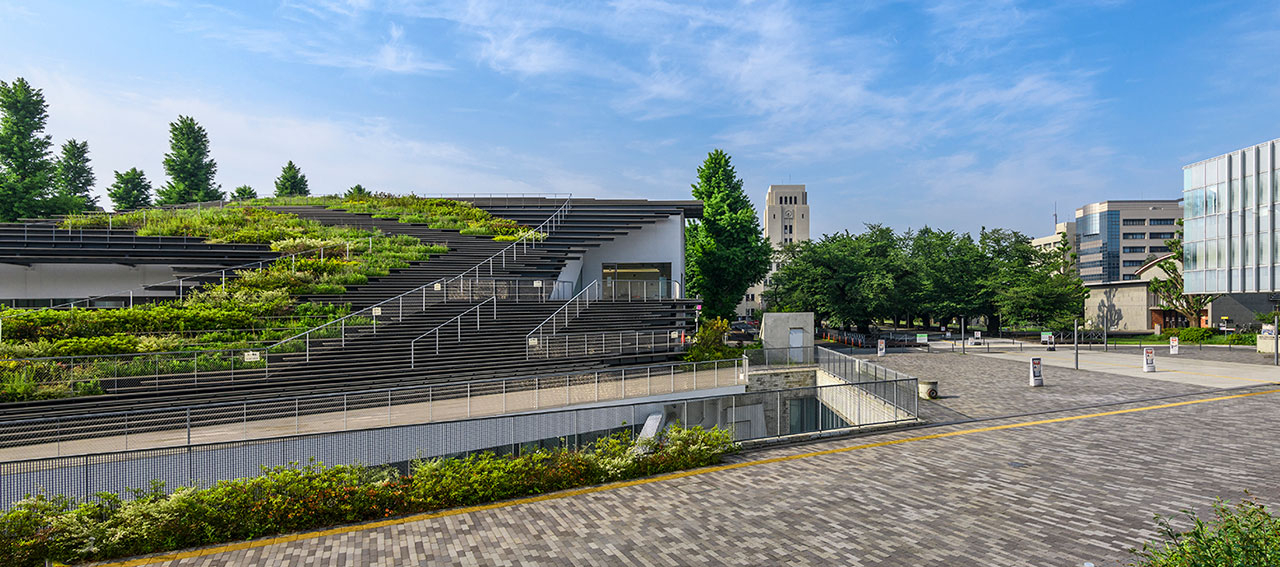
Amidst its sustained efforts to promote diversity and inclusion, Tokyo Tech has decided to introduce special quotas for Japanese-speaking prospective female students applying to the Institute's bachelor's degree programs through the recommendation-based entrance exam selection method and the comprehensive entrance exam* selection method from April 2024 onwards.
Four of Tokyo Tech's Schools — the School of Materials and Chemical Technology, the School of Computing, the School of Life Science and Technology, and the School of Environment and Society — will adopt the new framework in April 2024, while the School of Science and the School of Engineering will do so in April 2025. Once the new admission procedures come into effect at all Schools, the new quotas will make 143 positions available exclusively for female students. This constitutes approximately 14 percent of the 1,028 students admitted to Tokyo Tech's bachelor's degree programs each year.
These changes will not affect the application process for English-speaking prospective students.
- *
-
Formerly known as the admissions office (AO) entrance exam.
Not just a more diverse Tokyo Tech
Despite various initiatives to encourage more female students to study and conduct research at Tokyo Tech, the percentage of women in bachelor's degree programs stood at approximately 13 percent as of May 1, 2022. The introduction of female-only quotas aims to boost this figure and promote one of the Institute's key policies — diversity and inclusion — on Tokyo Tech's campuses. As a result, Tokyo Tech expects the ratio of female students to reach 20 percent at each of its Schools, and to surpass this figure across the entire Institute. New proactive measures aim to increase this ratio further in the more distant future.
While certain leading institutions have achieved a female ratio of 30 percent or higher in the fields of science, technology, engineering, and mathematics (STEM), efforts to reduce this gap further continue globally. At Japanese universities, however, the disparity is particularly noticeable. Tokyo Tech hopes that its efforts will develop into a movement among science and engineering-focused and other universities in the country, which together can take a big step towards closing the gap between the number of women and men studying for STEM-related degrees.
Revision of recommendation-based and comprehensive entrance exam selection methods
Japanese-speaking prospective students seeking to join Tokyo Tech's bachelor's degree programs can apply in one of three ways — General Admissions for the Bachelor's Program, the recommendation-based entrance exam selection method, or the comprehensive entrance exam selection method. Regardless of the method, all applicants must take the Common Test for University Admissions, a Japanese standardized test used nationwide for university admissions.
General Admissions for the Bachelor's Program consists of two stages — the Common Test for University Admissions and Tokyo Tech's own evaluation of each individual applicant. During this process, all applicants are subject to the same selection methods, examination subjects, and examination questions. The total number of applicants accepted for admission each spring through this process is currently 930, which accounts for approximately 90 percent of all applicants.
The recommendation-based and comprehensive entrance exam selection methods, on the other hand, vary slightly for each Tokyo Tech School. Applicants who choose one of these paths apply to the specific School of their preference. They must take the Common Test for University Admissions and fulfill any additional requirements prescribed by each School. Those applying through the recommendation-based entrance exam selection method must also obtain a reference, which is often provided by the principal of their high school. Under the current system, only the School of Science utilizes this method, while the other five Schools — the School of Engineering, the School of Materials and Chemical Technology, the School of Computing, the School of Life Science and Technology, and the School of Environmental and Society — use the comprehensive entrance exam selection method. The total number of annual applicants accepted for admission through these two methods is currently 98, which makes up approximately 10 percent of all applicants.
In the new framework, each Tokyo Tech School will adjust the content of their respective recommendation-based and comprehensive entrance exam selection methods, and the number of students admitted based on these methods will increase.
Future applications through the recommendation-based and comprehensive entrance exam selection methods will fall into two categories — the general quota for all applicants regardless of gender, and the female-only quota. The evaluation criteria between these two categories will differ, and hence, so will the selection methods. Female applicants may apply for both categories. The increase in the number of applicants applying through these methods will result in a decrease in the number of students admitted based on General Admissions for the Bachelor's Program. The total number of applicants accepted for each School will remain unchanged.
From academic year 2025 onwards, when all Tokyo Tech Schools have adopted the new framework, the number of applicants admitted through General Admissions for the Bachelor's Program will decrease to 801 applicants from the current 930 applicants. The total number of applicants admitted through the comprehensive and recommendation-based entrance exam selection methods will increase to 227 applicants from the current 98 applicants. This will include 84 applicants in the general quota and 143 applicants in the female-only quota.
Each School with their unique approach
Each School at Tokyo Tech will apply a unique approach to applicants taking the comprehensive or recommendation-based entrance exam path. The major changes for each School as of November 2022 are listed below.
School of Science
- Adoption of new selection methods: Fiscal year 2025, i.e. applies to students admitted in April 2025 or later
- New female-only quota for applicants applying via comprehensive entrance exam selection method
- Current recommendation-based entrance exam selection method, use of general quota to remain unchanged
- Number of applicants:
- General Admissions for the Bachelor's Program: Decrease from 143 to 128 applicants
- Comprehensive entrance exam selection method (female-only quota): New system — 15 applicants
- Recommendation-based entrance exam selection method (general quota): No change — 8 applicants
School of Engineering
- Adoption of new selection methods: Fiscal year 2025, i.e. applies to students admitted in April 2025 or later
- Comprehensive entrance exam selection method limited to women only to boost gender diversity
- Individual evaluation in new comprehensive entrance exam selection method will not include a written exam, but rather the Common Test for University Admissions covering understanding of relevant subjects and an individual interview
- Number of applicants:
- General Admissions for the Bachelor's Program:Decrease from 314 to 278 applicants
- Comprehensive entrance exam selection: Increase from 34 to 70 applicants (limited to female-only quota)
School of Materials and Chemical Technology
- Adoption of new selection methods: Fiscal year 2024, i.e. applies to students admitted in April 2024 or later
- Changes to comprehensive entrance exam selection method
- Individual evaluation in new comprehensive entrance exam selection method will not include a written exam, but rather the Common Test for University Admissions covering understanding of relevant subjects and an individual interview
- New comprehensive entrance exam selection method will include both general and female-only quotas
- Weight of score on the Common Test for University Admissions and interview differ for each quota
- Number of applicants:
- General Admissions for the Bachelor's Program: Decrease from 160 to 138 applicants
- Comprehensive entrance exam selection method: Increase from 18 total applicants to 20 applicants in general quota and 20 applicants in female-only quota
School of Computing
- Adoption of new selection methods: Fiscal year 2024, i.e. applies to students admitted in April 2024 or later
- Current comprehensive entrance exam selection method, use of general quota to remain unchanged
- Establishment of female-only quota similar to general quota
- Additional elements to female-only quota interviews
- Number of applicants:
- General Admissions for the Bachelor's Program: Decrease from 86 to 72 applicants
- Comprehensive entrance exam selection method: Increase from "approximately 6 total applicants" to 6 applicants in general quota and 14 applicants in female-only quota
School of Life Science and Technology
- Adoption of new selection methods: Fiscal year 2024, i.e. applies to students admitted in April 2024 or later
- Additional elements to the Common Test for University Admissions covering understanding of relevant subjects in current comprehensive entrance exam selection method, use of general quota to remain unchanged
- Start of new recommendation-based entrance exam selection method with both general quota and female-only quota
- Additional "study plan" required in application documents for female-only quota
- Number of applicants:
- General Admissions for the Bachelor's Program: Decrease from 135 to 105 applicants
- Comprehensive entrance exam selection method: No change — 15 applicants in general quota
- Recommendation-based entrance exam selection method (general quota): New system — 15 applicants
- Recommendation-based entrance exam selection method (female-only quota): New system — 15 applicants
School of Environment and Society
- Adoption of new selection methods: Fiscal year 2024, i.e. applies to students admitted in April 2024 or later
- Current comprehensive entrance exam selection method, use of general quota to remain unchanged
- Establishment of female-quota similar to general quota
- Additional "report on activities and achievements" required in application documents for female-only quota
- Number of applicants:
- General Admissions for the Bachelor's Program: Decrease from 92 to 80 applicants
- Comprehensive entrance exam selection method: Change from 17 total applicants to 20 applicants in general quota and 9 applicants in female-only quota
Through the implementation of these changes, Tokyo Tech hopes to open up more opportunities for female students who want to create a better future through innovative science and engineering.

Diversity and Inclusion
Tokyo Tech commits to realizing cultural development and contribution to human welfare by creating an intellectually vibrant environment.
Diversity and Inclusion at Tokyo Tech
. Any information published on this site will be valid in relation to Science Tokyo.




